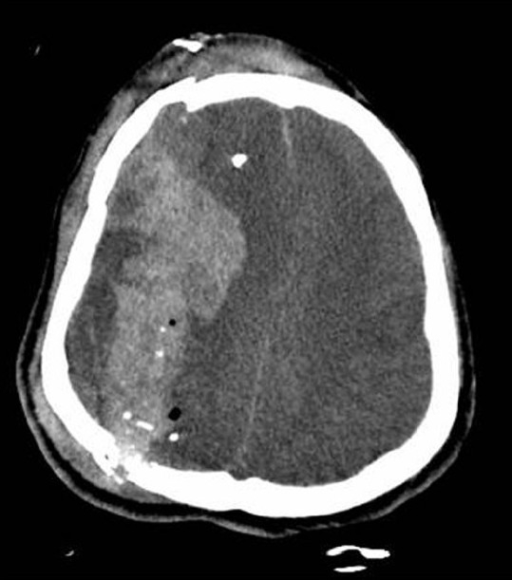Playlist
Show Playlist
Hide Playlist
Mild and Sport-related Traumatic Brain Injury
-
Slides Head Trauma Traumatic Brain Injury.pdf
-
Download Lecture Overview
00:01 Let's talk about each of the categories of TBI, mild, moderate and severe. 00:06 Mild TBI may be as mild as a concussion we call mild TBI concussion. 00:10 Common clinical symptoms include headache, dizziness, poor concentration, and insomnia. 00:16 We can also see other symptoms, emotional mood lability, irritability symptoms, visual disturbances, decreased appetite. 00:25 And mild TBI can range from mild symptoms immediately after the injury that resolves rapidly, or symptoms that persist for a short period of time, 1-2 weeks typically. 00:38 In terms of our evaluation of mild TBI or concussion, neuroimaging is not required for those patients, particularly in mild TBI patients who are asymptomatic or neurologically normal. 00:48 So that clinical exam, the sporting exam or immediately after a fall, or after a motor vehicle accident is critical in evaluating those patients. 00:58 In patients who do have underlying symptoms or neurologic abnormalities, imaging is important in the evaluation of those patients. 01:05 And treatment really begins with removing the patient from potential furthering of harm, whether that be a motor vehicle or an at risk situation or a sporting event or those sorts of things. 01:19 What about sports-related TBI? Let's talk about that just a minute as it gets a lot of interest. 01:25 This is simply a TBI like any other but the mechanism here is a sports-related process. 01:31 Sports-related concussion is like other TBI. 01:33 So we're going to use the information we just talked about to think about this setting. 01:38 This is the clinical syndrome of biomechanically induced alteration of brain function as a result of an injury during a sporting event. 01:47 Typically affects things like memory, orientation, mood, and dizziness, may involve some level of loss of consciousness depending on the severity of the sports-related trauma. 01:59 What are some of the risk factors for a sports-related concussion? I want you to think about a number of different areas. 02:05 First is the sport. 02:06 High contact sports have a higher risk of concussions. 02:10 So we think about those with football, rugby, hockey or soccer. 02:14 But any sporting event where there can be injury to the head potentially puts a person or a patient at risk for concussion. 02:22 What about gender? Differences in risk between men and women athletes have not been demonstrated universally in the vast majority of sports. 02:30 And so there's an equal risk in both men and women. 02:33 The issue is the sports-related event as opposed to the underlying gender of the individual. 02:39 There is some exceptions with soccer and basketball where there's some strong evidence to suggest that the risk is greater in female athletes in these sports. 02:48 And then lastly, and most importantly, prior concussion. 02:52 So history of concussion or a mild TBI is a significant risk factor for additional concussions. 02:58 And so we really need to look at the lifetime of that athlete as we're evaluating both before each season of play and longitudinally over time. 03:07 We want to evaluate a patient with concussion, but also consider the lifetime of their risk during that sporting event. 03:16 A second concussion and significant brain injury is more likely to occur within 10 days after a prior concussion. 03:23 And this is really important, that second hit second injury that we talked about after a traumatic event is at much higher risk in patients who have recently experienced an initial concussion within the first 10 days. 03:35 And so we really want to avoid the potential of factors that could contribute to concussion within the first 1-2 weeks after a patient who has suffered sports-related concussion or mild TBI. 03:50 And then equipment use of helmet reduces the risk but does not eliminate the risk of concussion. 03:54 It's really the type of action that is contributing to concussion. 03:58 Helmets are important. 03:59 We need to wear them in sports-related and nonsports-related activities where the brain could be injured and they do reduce the risk, but obviously do not eliminate it. 04:10 And then how about age or competition level or position in a sport? There's really not evidence to say that age, competition, level or position increased the risk substantially of a sports-related concussion. 04:24 And interestingly, patients during practice, such as football practice sustain more micro head injuries, small subconcussive injuries that over the lifetime of a sporting activity can contribute to long term brain changes, then some of those major hits that we may see in a game or actual professional activity. 04:47 How do we evaluate patients? CT imaging, as we've talked about is important in evaluating TBI and can be used and can be necessary for patients with sports-related concussion. 04:58 But it's not required particularly in patients who have a mild traumatic brain injury or mild concussion. 05:04 Imaging can be obtained to rule out more serious TBI or associated injuries such as intracranial hemorrhage or an open skull fracture. 05:14 And this is particularly important for patients who have evidence of prolonged loss of consciousness, posttraumatic amnesia or persistent alteration in mental status focal neurologic deficits or impairment in their Glasgow Coma Scale. 05:28 When should athletes return to play? Athletes should be prohibited from returning to play or practice until a licensed healthcare professional has judged that the concussion has completely resolved. 05:41 And we're really looking at symptoms, we're looking at symptoms at rest, we're looking at symptoms that at activity to guide us on whether the concussion has completely resolved both cognitive, emotional and physical symptoms are important to evaluate in these patients. 05:57 Individuals supervising athletes should prohibit the athlete with concussion from returning to play or practice until the athlete is completely asymptomatic and off medications. 06:07 And that's really important as we stratify their risk of a second injury and the safety in returning to play. 06:14 In cases of athletes in high school age or younger who are diagnosed with concussion, they really should be managed more conservatively regarding return to play. 06:23 And this is important to be evaluated by a licensed healthcare professional. 06:30 What's the role of the physician, the neurologist or other physicians in evaluating these patients in return and determining or assisting with return to play guidance? Neurologist may be helpful in supplementing information and evaluation of these patients, particularly in conducting neurocognitive testing or neurologic examination and can assist in determining concussion resolution. 06:53 We're looking for symptom resolution, which a detailed neurologic exam can help to guide. 06:59 We counsel athletes with a history of multiple concussions and persistent neurobehavioral impairments about the risk of long term and permanent injury which is important in counseling these patients.
About the Lecture
The lecture Mild and Sport-related Traumatic Brain Injury by Roy Strowd, MD is from the course Head Trauma.
Included Quiz Questions
What is another term for mild TBI that presents with headaches, dizziness, poor concentration, and insomnia?
- Concussion
- Closed head injury
- Blast injury
- Chronic traumatic encephalopathy
- Acute traumatic encephalopathy
Which neuroimaging modality is required to diagnose a concussion?
- None
- T1-weighted MRI
- Non-contrast CT head
- CT head with contrast
- CT angiography
What is the first step in managing a patient with a concussion?
- Removing the patient from further harm
- Intubation
- Fluid resuscitation
- Hospital admission
- ICP monitoring
Within what time frame of an initial sports-related concussion is a second concussion most likely to occur?
- Within 10 days
- Within 3 months
- Within 2 days
- Within 3 weeks
- Within 1 month
What sign or symptom requires further imaging in a patient with a suspected concussion?
- Post-traumatic amnesia
- Mood disturbance
- Insomnia
- Dizziness
- Poor concentration
Customer reviews
5,0 of 5 stars
| 5 Stars |
|
5 |
| 4 Stars |
|
0 |
| 3 Stars |
|
0 |
| 2 Stars |
|
0 |
| 1 Star |
|
0 |




